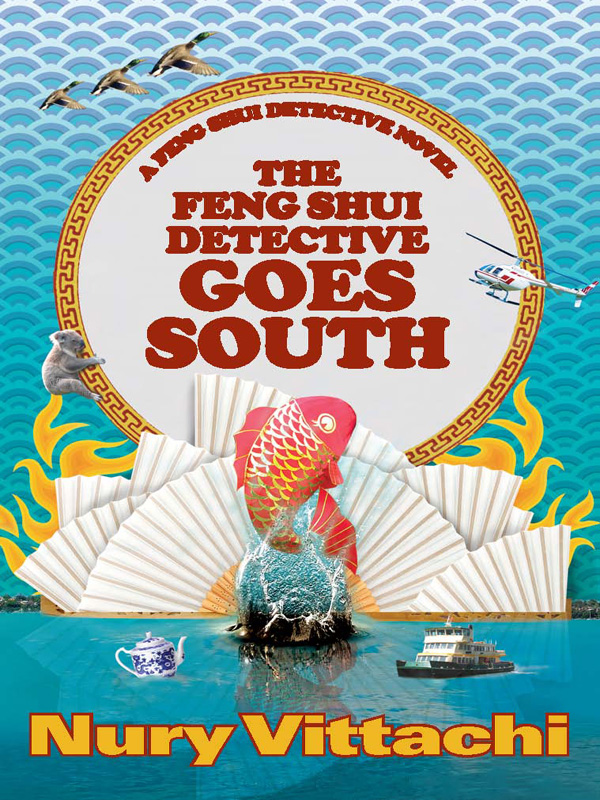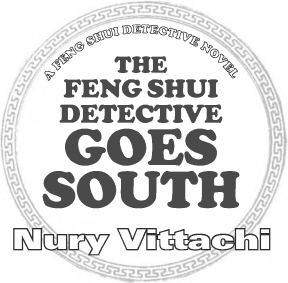The Feng Shui Detective Goes South

P
RAISE FOR
N
URY
V
ITTACHI
AND
T
HE
F
ENG
S
HUI
D
ETECTIVE BOOKS
‘Unsurpassable mixture of humor, wisdom and whodunnit.’
The Crime Forum,
Germany
‘A very funny book. Dangerously so at times.’
That’s Beijing
‘Wacky and hilarious whodunit—you just have to dig in
and hold on for the wild ride.’
Asian Review of Books
‘An international bestseller whose unlikely sleuths appear
to be heading for cult status.’
Herald Sun,
Melbourne
‘Totally engrossing and very, very funny.’
Radio 3AK,
Melbourne
‘If Hollywood wakes up . . .’
The Australian
‘One of the most droll, attractive and unusual
of modern amateur detectives.’
The Bulletin
‘Should bear a large red label warning against its being read
while consuming beverages, lest unwary readers wind up
spitting tea through their nose as I did.’
That’s Beijing
‘The story is populated by a stream of eccentric characters and
amusing examples of Singapore’s polyglot, multiethnic culture . . .
a tasty smorgasbord of modern Asian life.’
Japan Times
‘Does for the flow of ch’i what Sherlock Holmes
did for cocaine.’
South China Morning Post
‘The man who made Lee Kuan Yew laugh.’
The New Paper,
Singapore
A
UTHOR’S NOTE
The feng shui techniques in this book are mostly from the Flying Star School and the Form School of East Asia. The vaastu principles are from the northern Indian school. The ancient Chinese philosophy, stories and quotes from Confucius and other sages are largely genuine and come from texts up to 2 500 years old. The extracts from ‘Some Gleanings of Oriental Wisdom’ are by CF Wong, with spelling and grammar corrections by J McQuinnie.


First published in 2002
This edition published in Australia and New Zealand by
Allen & Unwin in 2009
Copyright © Nury Vittachi 2002
All rights reserved. No part of this book may be reproduced or transmitted in any form or by any means, electronic or mechanical, including photocopying, recording or by any information storage and retrieval system, without prior permission in writing from the publisher. The
Australian Copyright Act 1968
(the Act) allows a maximum of one chapter or 10 per cent of this book, whichever is the greater, to be photocopied by any educational institution for its educational purposes provided that the educational institution (or body that administers it) has given a remuneration notice to Copyright Agency Limited (CAL) under the Act.
Allen & Unwin
83 Alexander Street
Crows Nest NSW 2065
Australia
Phone: (61 2) 8425 0100
Fax: (61 2) 9906 2218
Email: [email protected]
Web:
www.allenandunwin.com
National Library of Australia
Cataloguing-in-Publication entry:
Vittachi, Nury, 1958–
The feng shui detective goes south
ISBN: 978 1 74175 553 4 (pbk.)
823.92
Cover and text designed by Design by Committee
Typeset by Midland Typesetters, Australia
Printed in Australia by McPherson’s Printing Group
10 9 8 7 6 5 4 3 2 1

The pages of this book are printed on 100% ancient-forest
friendly paper.
The paper this book is printed on is certified by the © 1996 Forest Stewardship Council A.C. (FSC). The printer holds FSC chain of custody SCS-COC-004121. The FSC promotes environmentally responsible, socially beneficial and economically viable management of the world’s forests.
Contents
1
Saturday: Dying is very bad feng shui
2
Monday: Crimes committed by dead people
3
Tuesday: No such thing as ghosts
4
Wednesday: Life is not a mini-series
5
Thursday: Ghosts can’t get any deader
Saturday:
Dying
is very bad
feng shui

‘Endings are a type of beginning’
– CF Wong
There was something seriously wrong with the apartment, but he did not have the faintest idea what it was. He closed his eyes, tilted his head upwards and inhaled deeply, seeking to strike some sort of harmony with his environment. He held his breath—for one long minute.
Then he let it out again. As the air flowed from his lungs, he tried to empty himself and become one with his surroundings.
A tiny but sharp feeling of discord remained. ‘Not good, not good,’ he mumbled to himself.
But
why
was it not good? He opened his eyes and scanned the clean, bright rooms again, his brows knotted and lips pursed. What was so bad about the place?
He became aware that his discomfort was perturbing his client.
‘Something wrong, right?’ Cady Tsai-Leibler said, pausing over her teapot.
Before he could answer, there was the noise of glass shattering in a room nearby. Without moving, the young mother shouted: ‘Melly? Did you break something? Be careful, okay?’
‘Okay, Mama,’ said the voice of a small girl over the sound of pieces of glass being swept across a tiled floor by a shoe.
Mrs Tsai-Leibler lowered her James Sadler teapot and went to investigate.
Happier to be alone, CF Wong cast his eyes around the room again.
The 1712-square-foot apartment in a subdivided house in the rural part of Singapore’s Ridley Park seemed perfect. It had been carefully selected by its new owners for its position. The building stood on a gentle slope on a plot overlooking one of the old black-and-whites. It had a breathable open space to the front and was pleasingly if rather boringly proportioned as a series of rectangles on three stories. But it just didn’t feel right.
‘Must think,’ said the feng shui master, flopping down in a seat on the small balcony that looked over a tastefully designed Chinese garden.
According to the technical demands of the ancient beliefs of geographical placement, it was fine. The block was a rectangular construction on an almost square podium, and belonged to the K’un orientation, with its door facing south-west. The main room faced due west of the centre. This was one of the more prosperous directions for the main living space, and was known as the Direction of the Celestial Physician.
There was a potential clash within the flow of
ch
’
i
moving from the kitchen to the second bedroom which was directly opposite, but nothing that couldn’t be fixed with the judicious placing of suitable objects to catch and divert any unsuitable rush of water or fire energy.
The salmon gloss the woman of the house had chosen for the main room would have been uncomfortable for many people, but he realised that it was perfect for her. Calida ‘Cady’ Tsai-Leibler, an executive secretary of Hong Kong origin married to a dentist from New York, was a wood person born under the sign of the ram.
‘
Mutyeh si?
’ he breathed, tapping his knuckles against the side of his forehead.
What was the matter?
The family had owned the apartment for three weeks, but had only moved in two days earlier. Although much of the furniture had been unpacked and laid out, the main living area remained pleasantly uncluttered. Wong was pleased to see that Mrs Tsai-Leibler had gone for an American-style open plan design, rather than the jam-packed every-centimetre-used style characteristic of Hong Kong flats. The apartment, as it stood, had a series of pleasant routes through which
ch
’
i
could flow and pool itself. So what was wrong?

The door to a room being used to store boxes yet to be unpacked swung open and Mrs Tsai-Leibler’s husband entered the living room. A large, unsmiling man with a glowering forehead, his presence immediately made the room too small.
‘Finished?’ Gibson Leibler growled, directing his comment at his wife rather than at the feng shui master. His face said: I hope so.